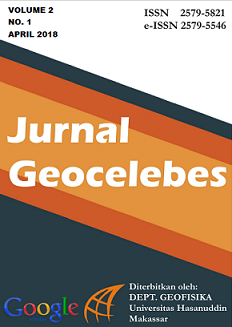IDENTIFIKASI SEBARAN MINERAL SULFIDA (PIRIT) MENGGUNAKAN METODE GEOMAGNET DI DAERAH LIBURENG KABUPATEN BONE
DOI:
https://doi.org/10.20956/geocelebes.v2i1.3789Abstract
Penelitian ini dilakukan dengan metode geomagnet di daerah libureng kabupaten Bone, Sulawesi Selatan. Ada 65 titik pengukuran dengan luas 120 m untuk mengidentifikasi sebaran mineral sulfida. Panjang lintasan 100 m dengan spasi 20 m menggunakan satu alat magnetometer. Koreksi data dengan filter upward continuation serta metode foward modeling menggunakan perangkat lunak Mag2dc. Dari hasil analisis data diperoleh nilai anomali berkisar antara -1700 sampai 8000 nT. Interpretasi menujukkan Batuan beku andesit (1.6801 x 10-3 SI) yang mengintrusi batuan sedimen batugamping (0.3554 x 10-3 SI). Mineral sulfida disseminated dan berasosiasi dengan batulempung (0.2 x 10-3 SI), dolomit (0.0815 x 10-3), dan breksi (0.7802 x 10-3 SI).Downloads
Downloads
Published
2018-04-17
How to Cite
Zulfitrah, M., Lantu, L., & Syamsuddin, S. (2018). IDENTIFIKASI SEBARAN MINERAL SULFIDA (PIRIT) MENGGUNAKAN METODE GEOMAGNET DI DAERAH LIBURENG KABUPATEN BONE. JURNAL GEOCELEBES, 2(1), 36-41. https://doi.org/10.20956/geocelebes.v2i1.3789
Issue
Section
Articles
License
Authors who publish with this journal agree to the following terms:
- Authors retain copyright and grant the journal right of first publication with the work simultaneously licensed under a Creative Commons Attribution License that allows others to share the work with an acknowledgement of the work's authorship and initial publication in this journal.
- Authors are able to enter into separate, additional contractual arrangements for the non-exclusive distribution of the journal's published version of the work (e.g., post it to an institutional repository or publish it in a book), with an acknowledgement of its initial publication in this journal.
- Authors are permitted and encouraged to post their work online (e.g., in institutional repositories or on their website) prior to and during the submission process, as it can lead to productive exchanges, as well as earlier and greater citation of published work (See The Effect of Open Access).



